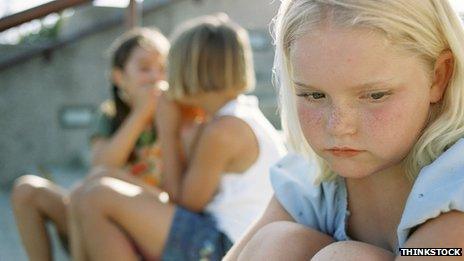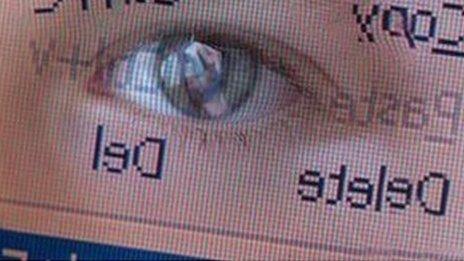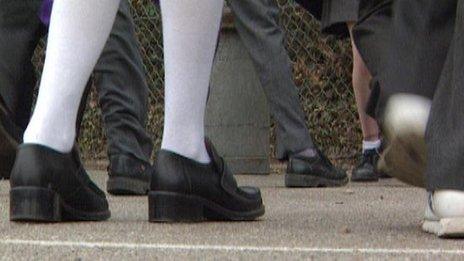What should you do if your child is 'the bully'?
- Published

Anti-Bullying Week focuses on beating bullies and empowering victims but what if you have evidence that your child is habitually cruel to others?
"No thank you. Sorry to have to say this but we have decided that we don't want Zoe to play with your daughter again."
The shock and shame of rejection stung as our offer of a play date for our three-year-old daughter's best friend was politely but definitively rejected by her mum.
The girls had been friends since they were tiny but our daughter was bigger and stronger and had started thumping their daughter and now her mum had decided enough was enough.
Our daughter had shown behaviour fairly common among three-year-olds but as parents we now had to work hard to persuade her to stop using her fists to resolve arguments and help her avoid a pejorative label.
Repetitive behaviour
A survey of more than 1,000 UK parents for Anti-Bullying Week suggests about a third suspect their son or daughter may be a bully.
And 6% have evidence of online bullying carried out by their child.
The Anti-Bullying Alliance defines bullying as repetitive behaviour that involves an imbalance of power. So a tall three-year-old who repeatedly thumps a smaller one fits this definition.
The children were at different nurseries so it was easy to split them up and move on.
But as children grow older, bullying becomes more complicated to tackle, particularly once they start school and launch themselves online.
Bill's 10-year-old daughter, Melanie, an animal lover, joined an online pet-based game with a group of local friends with similar interests.
The game helps children discover the joys and responsibilities of owning a pet. It seemed safe enough so the parents let them get on with it.
Bill says he was "gobsmacked" by what happened next.
A phone call from another parent revealed that the girls had been posting online messages threatening to kill a younger child's pet.
Every time she joined the game she was greeted with a barrage of messages along the lines of: "Splodge must die!"

Internet bullying is a particularly tricky parenting challenge, says Justine Roberts, chief executive of the parenting website Mumsnet
Parenting challenge
Bill says his daughter wasn't the ring leader but had gone along with the group.
"I was completely blown away," he says.
"This is not the way she was brought up nor the way I imagined she would behave in such circumstances."
Melanie was made to apologise and banned from using the game for a month.
Justine Roberts, chief executive of the parenting website Mumsnet, describes the internet as "a particularly tricky parenting challenge" but says the advice on bullying is the same whatever the circumstances.
"It's never pleasant to realise your child might be bullying others, but it happens and you need to confront it," she says.
Mumsnet advises: "Bullying isn't always someone else's kids. You might find your own child is involved in cruelty to a classmate. If so, act fast. This is totally unacceptable behaviour and your child needs to be clear on that.
"Admit, atone, apologise. Your child needs to acknowledge what has happened, to understand it has been hurtful and harmful, and to say sorry for it."

Not all parents are willing to accept that their child has been involved in playground cruelty to another child, says one head teacher
But not all parents are willing to admit their child has been involved in bullying.
Victimisation
One primary head teacher, who has asked to remain anonymous, says she was shocked at the attitudes of parents whose sons had victimised a pair of brothers.
She says: "They just couldn't accept their children's behaviour, despite reliable evidence from teachers on duty in the playground and the fact their boys had admitted what they had done and apologised to the victims."
Instead of helping a younger boy who had fallen, banged his head and was crying, the group of 11-year-olds taunted him and stopped him lining up for class.
They did this to get at his brother who was their age but a bit of a loner.
In a letter home, the head described the behaviour as deeply disappointing and totally unacceptable and asked the parents to work with the school to make this clear.
She says: "Only one parent was willing to work with me. The rest refused to believe the evidence, argued with me, accused me of bullying their sons and ostracised the other mother for about a year and a half."
"It's mortifying for a parent to hear their child has been a bully. It really sets the emotions racing."
Parents naturally want to protect their children and for this group of "fierce parents" this was the right way to behave.
It meant that although the children had apologised at school their parents had backed up their poor behaviour.
It led to an "uncomfortable atmosphere" for years afterwards, says the head.
Prof Dieter Wolke, of Warwick University, an expert in the psychology of childhood bullying, says bullies can often fall into two types - "pure bullies" and "bully-victims".
He says "pure bullies" are often very good at reading social situations, nice to adults and popular with many of their own age group.
By contrast "bully-victims" can sometimes have poor self-control, easily fly off the handle and exhibit aggressive behaviour.
The "pure bully" will be controlling a situation while the "bully-victim" does the dirty work, says Prof Wolke.
So while parents of "bully-victims" may notice and admit to their child's difficult behaviour, the parents of "pure bullies" see little evidence and so deny it.
Some parents are themselves bullies, says Prof Wolke, and may believe that bullying is a fact of life and so reinforce their children's behaviour,
"The terrible thing is that there is little downside for a really successful 'pure bully'," he says, particularly in early adolescence when research has indicated their numbers rise to about 10% of boys and 8% of girls.
The good news from the same research is that the numbers of both type of bully drop among older teenagers - as does the number of victims.
Luke Roberts, of the Anti-Bullying Alliance, says it is important for adults to ask bullies to consider the starting point for their behaviour.
He says: "Ask them, 'What has this person done to offend you so much that you think this is an appropriate response?'"
'Addictive'
But Mr Roberts says that once bullies get a taste of power it can become addictive.
He too advocates a rapid apology as the best and most effective way of dealing with bullying long term.
Bill says that he is pretty confident that a firm co-ordinated response from adults has stopped Melanie and her friends doing it again.
Another parent, writing anonymously on Mumsnet, described herself as "really shocked" when she was telephoned by the school about her daughter's behaviour.
"She was part of a group of girls and one of them had been increasingly left out of things or ignored.
"The school had dealt with it and we reinforced the message at home that the behaviour was unpleasant and unacceptable.
"She was a bit subdued for a few days, as were the others in the group, but within a week it was all over and they were friends again."
As for my own daughter, now an adult, she long ago left any kind of bullying behind her.
Some names have been changed.
- Published18 November 2013
- Published17 August 2013
- Published31 October 2013
- Published11 August 2013
- Published24 August 2013